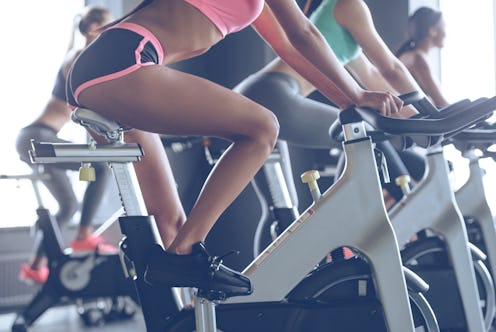News
Your Body Type Shapes Your View of Exercise

The way women's brains respond to images of exercise varies by body type, according to a new neurological study. Attitudes toward exercise "may be more influenced by our body size than has previously been understood," the New York Times reports. For the study, published in the International Journal of Obesity, Chinese scientists looked at 13 normal-weight young women and 13 young women who were overweight or obese (based on body mass index). Using a fMRI scan, the scientists measured blood flow to different areas of the brain (indicating increased activity) while the women looked at images of people exercising and people hanging out.
Each slideshow included 90 images of people actively enjoying physical activity such as running, dancing, and playing tennis; 90 images of people relaxing by, say, sitting in a desk chair or lying on a couch; and 90 landscape images (to operate like neural palette-cleansers). The women were asked to "vividly imagine" themselves engaging in these activities.
The resulting readouts revealed that overweight women’s brains were put off by exercise. Shown images of people being active, these women developed little activation in the putamen region of the brain, suggesting that they did not enjoy what they were seeing. At the same time, a portion of the brain related to dealing with negative emotions lit up far more when they viewed images of moving than of sitting. Emotionally, the brain scans suggested, they anticipated disliking physical activity much more than they expected to disdain sitting. Leaner women’s brain activity, by and large, was the opposite, with the putamen lighting up when they watched others work out and envisaged doing the same themselves.
At the start of the study, all the women filled out questionnaires about their feelings toward exercise, including questions about how exercise would influence social lives and how unpleasant, embarrassing, or painful exercise might be. Overweight women were more likely to have negative associations of exercise when probed more overtly about it, as well. It's impossible to know what came first, exercise dislike or weight gain.
So far, the comments on Reddit about this are...not inspiring. I wonder how my brain (attached to my normal-weight body) would respond to images of exercise — I can't imagine my brain cells "lighting up" upon seeing images of joggers. But I also don't like lying around. Maybe next time they could also include pictures of people sitting in coffee shops or drinking on rooftops? Would it be weird if my brain lit up most at the landscapes? Can I get in on this next time?
Image: Fotolia